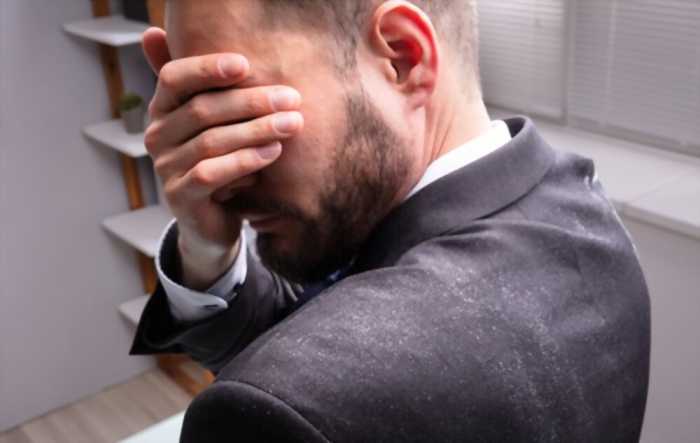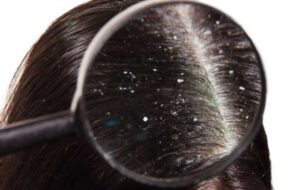 Skin cells are constantly renewing, including on the scalp. New cells are formed under the skin, at the top the old cells are released in the form of small flakes. In normal skin, these flakes are small and (almost) invisible. Eczema occurs when this renewal process is faster than normal, causing more flakes to appear. At the same time, the old skin cells tend to clump together, so in this shape and size they are suddenly visible.
Skin cells are constantly renewing, including on the scalp. New cells are formed under the skin, at the top the old cells are released in the form of small flakes. In normal skin, these flakes are small and (almost) invisible. Eczema occurs when this renewal process is faster than normal, causing more flakes to appear. At the same time, the old skin cells tend to clump together, so in this shape and size they are suddenly visible.
Those uncharming flakes on dark clothing reveal a mild form of eczema on the hairy part of the scalp, known as dandruff, which is often accompanied by itchiness, oily scalp and hair. This form of eczema is also called seborrheic eczema, the official name of dandruff is pityriasis capitis.
As annoying as the condition is, dandruff is basically harmless and does not require a doctor’s visit unless it is no longer just normal flakes, but thick patches of skin come off or the scalp becomes inflamed.
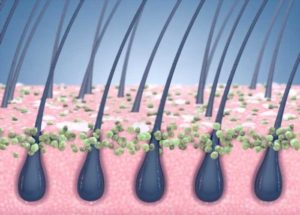 What Causes Dandruff?
What Causes Dandruff?
The degree of dandruff can vary from person to person, the exact cause is unknown. The three main factors that play a role in the development of dandruff are:
- Sebum production
Sebum prevents the skin from drying out and keeps it oily. The amount of sebum produced by the sebaceous glands differs per person, some have oily skin, others have dry to very dry skin. Usually there is an increased sebum production and thus an oily scalp in those who are predisposed to dandruff.
(Read more) << “Treat oily hair and scalp naturally” >>
- Yeasts
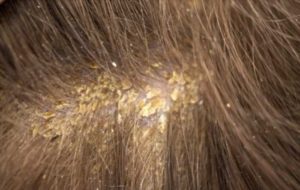 Although they occur naturally in everyone, their numbers are much higher in people with dandruff: various types of yeasts, such as Malassezia furfur, Malassezia globosa and Malassezia restricta, which live on the fatty layer on the skin. These yeasts produce enzymes that break down the sebum fat into saturated fatty acids, which are then absorbed by the yeasts, and unsaturated fatty acids. The unsaturated fatty acids remain on the skin, irritate the skin and cause eczema. In case of dandruff, this seborrheic eczema is found on the scalp, but can also develop on the face (in the eyebrows and next to the nose) or on the chest.
Although they occur naturally in everyone, their numbers are much higher in people with dandruff: various types of yeasts, such as Malassezia furfur, Malassezia globosa and Malassezia restricta, which live on the fatty layer on the skin. These yeasts produce enzymes that break down the sebum fat into saturated fatty acids, which are then absorbed by the yeasts, and unsaturated fatty acids. The unsaturated fatty acids remain on the skin, irritate the skin and cause eczema. In case of dandruff, this seborrheic eczema is found on the scalp, but can also develop on the face (in the eyebrows and next to the nose) or on the chest.
- Genetic susceptibility
Like eczema, susceptibility to dandruff is also genetic. And internal factors (seborrheic) eczema or psoriasis causes excessive dandruff. In addition, external factors such as stress, nervousness or fatigue can aggravate the appearance of dandruff.Moreover, daily use of gel or hairspray, and frequent or too hot blow-drying your hair, scalp sensitizes the formation of dandruff.
A number of other factors that cause excessive flaking of the scalp are drying out of the skin and hair due to the use of shampoos against oily hair, skin irritation due to the ingredients of shampoo or other care products, or a too dry (indoor) climate.
Dandruff is common and usually begins in puberty. Both men and women can be affected, although it is slightly more common in men than women. It affects about half of the population between the ages of 20 and 50.  It usually decreases after age 50. Also in babies, greasy flakes sometimes appear on the head during the first months of life, this form of dandruff is called ‘cradle cap’.
It usually decreases after age 50. Also in babies, greasy flakes sometimes appear on the head during the first months of life, this form of dandruff is called ‘cradle cap’.
Dandruff is not contagious. The yeasts that play a role are found on everyone’s skin, but only increase in number under special circumstances, and only cause problems in people who are more sensitive to them.
Dandruff also does not cause baldness. Sometimes hairs come along with the peeling flakes so that it looks like you are losing more hair. The hair follicles are not damaged by dandruff, so they simply produce new hairs.
Are there any natural remedies for dandruff?
With the available anti-dandruff shampoos, this problem can be treated well and kept under control. The various products can be aimed at inhibiting inflammation and itching of the scalp, whilst others reduce flaking, and some fight yeasts, which can greatly improve the eczema and make dandruff (almost) disappear completely.
Most of these products contain SLS (sodium lauryl sulphate), a widely used and powerful detergent that also ensures that liquid foams easily. Ideal for shampoos, shower gels and toothpastes. An additional disadvantage of the degreasing and dirt-removing effect, however, is that it affects the epidermis, disrupts the pH value, dries out and damages the skin – the result: itching and skin flakes.
Natural remedies and (essential) oils, on the other hand, have no aggressive side effects on the skin and can greatly contribute to the treatment of dandruff. In addition, choose a mild or pH-neutral shampoo and always wash hair care products well so that no residue is left on the skin.
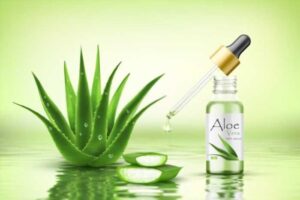 Aloe Vera
Aloe Vera
Thanks to its antibacterial and antifungal properties, Aloe Vera helps prevent dandruff. In addition, it breaks down proteins, in this case it mainly concerns dead skin cells, reducing their amount and reducing the dandruff-causing clots.
How do you proceed? Regularly massage aloe vera on the scalp, let it rest for at least 15 minutes, and wash it off with a mild shampoo.
Lemongrass Oil
Lemongrass oil acts as an effective cleanser and has healing properties. In addition to soothing itchiness and an irritated scalp, it helps strengthen hair follicles.
How do you proceed? Mix 10 drops of lemongrass oil with your usual shampoo or conditioner. Or, along with your conditioner, massage 2-3 drops into your scalp.
Tip: As a pleasant side effect, lemongrass oil has the ability to act as a natural insect repellent, and can help relieve stress (which often accompanies hair loss) and headaches.
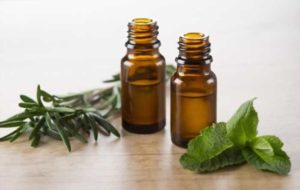 Tea Tree Oil
Tea Tree Oil
A proven remedy for dandruff – Tea tree oil is an antiseptic oil with antifungal activity and is an ingredient in several anti-dandruff shampoos. This essential oil is ideal as a simple home remedy for treating the scalp.
How do you proceed? Massage the tea tree oil into the scalp, make sure it not only gets into your hair, but actually gets onto the skin and let it rest for 30 minutes. Then wash out with shampoo. By regularly incorporating this into your usual routine, you will notice that not only will the dandruff be reduced, but so will the itching that comes with it.
Tip: Use of pure tea tree oil on (sensitive) skin is not recommended, dilute 15 to 20 drops of oil with equal parts water and vinegar. The acid in vinegar helps to restore the pH balance of the skin and, in particular apple cider vinegar, cleans clogged pores and hair follicles.
Lemon Oil
Lemon essential oil is known to combat dandruff, it also helps to keep the hair vital and soft and ensures a healthy scalp. Like vinegar, lemon acid restores pH balance.
How do you proceed? Massage the lemon oil mixed with water into the scalp. Let it sit for some time before washing it out with a mild shampoo.
Tip: Lemon oil can be mixed well with other (essential) oils, for example the combination with lavender oil is very popular. Lavender oil has antimicrobial properties and can help fight bacterial and fungal disorders.
Note that lemon oil has a bleaching effect on hair in direct sunlight. The natural effect of highlights is a nice extra application if you are a fan of this.
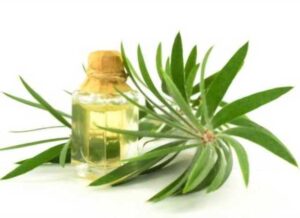 Rosemary Oil
Rosemary Oil
Its wonderful aroma alone is reason enough to use rosemary oil to care for your hair. With the added bonus that, thanks to its antibacterial and antifungal properties, it effectively helps treat dandruff and dry scalp.
How do you proceed? Mix rosemary oil with equal parts olive oil and take a few minutes to gently massage the mixture into the scalp. Then leave it in your hair for 3 to 4 hours and wash it out with a mild shampoo.
Tip: Rosemary oil is one of the best essential oils to promote hair growth and firmness. It is applied to increase cellular metabolism, which stimulates hair growth and healing.
Peppermint Oil
Peppermint oil has powerful antiseptic properties and is therefore able to treat dandruff and even lice. It stimulates the scalp and this oil has also been shown to promote hair growth.
Applying this oil to the skin has a pleasant cooling and calming effect and it reduces skin inflammation.
How do you proceed? Simply mix a few drops of peppermint oil with your shampoo or conditioner.
Tip: The refreshing aroma of peppermint relieves headaches, energizes your mind and boosts your mood. Start your day bright and cheerful with peppermint oil during your morning shower.
Dandruff often worsens at lower temperatures and low humidity. During cold weather and with the heating on, you can suffer more from it, while sunlight actually improves it.
So take advantage of the sunny days as much as possible.

References:
https://www.huidziekten.nl/folders/nederlands/hoofdroos.htm#:~:text=Was%20uw%20haar%20elke%20dag,kunnen%20die%20de%20hoofdhuid%20irriteren.
https://www.nu.nl/gezondheid/6009797/roos-is-een-vervelende-kwaal-hoe-kom-je-er-aan-en-hoe-kom-je-er-vanaf.html
https://www.nu.nl/gezondheid/6009797/roos-is-een-vervelende-kwaal-hoe-kom-je-er-aan-en-hoe-kom-je-er-vanaf.htmlhttps://www.ahealthylife.nl/10-natuurlijke-huismiddeltjes-tegen-roos/
https://etherische-olie.com/etherische-citroenolie-is-goed-voor-uw-haar/
http://www.nailtalk.nl/de-7-beste-essentiele-olien-voor-haar/
